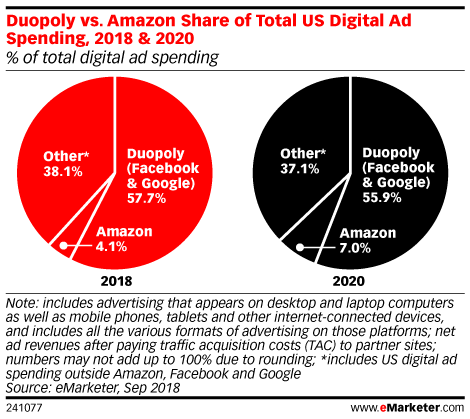“Ummm…I just saw an ad for Legos and we were just talking about them last night. My phone is definitely listening and showing ads based on what I’ve said!”

Sound familiar? It has all the facets of a modern blockbuster thriller: a big, evil technology company listening to our private conversations and using them against us to sell more widgets. Well, maybe not a blockbuster, but it’s at least a mediocre episode of Black Mirror.
This theory has been floating around for a while and has begun to draw the attention of major news outlets like the BBC and Vice.
There’s even been enough mounting pressure to garner statements from the usually tight-lipped Google and Facebook.
Google’s direct-and-to-the-point statement: “We do not use ambient sound from any device to target ads.”
Facebook’s similar statement: “Facebook does not use your phone’s microphone to inform ads or to change what you see in News Feed.”
These assurances from the tech giants who own more than 57% of the digital advertising market share aren’t overly comforting. It feels a bit like the Wizard of Oz telling us to ”pay no attention to that man behind the curtain.”

And from a technology standpoint, a big technology company has the capabilities and resources to put this in action.
But, alas, this is not happening. Big tech companies are not using our conversations to show us targeted ads.
“I don’t believe you. I was talking about Legos, and now I’m seeing an ad for Legos. If they’re not showing me ads based on my conversations, how did they know I’m interested in Legos?”
Even without your voice, you supply Google, Facebook, and Amazon (61.8% of all digital advertising) with a ton of data. Really, they know a lot about you. And these companies are ceaselessly using that data to figure out what you might like and show you ads for those potential interests.
Let’s look at Facebook (who also owns Instagram) as an example:
- They know everything you’ve included on your About page (e.g. birthday, prior jobs, gender, places you’ve lived)
- They know every picture you’ve ever liked or viewed on Instagram and Facebook
- They know every company or page you’ve liked on Facebook
- They know how many friends you have, who those friends are, and what your friends like
- They know every location you’ve ever used Instagram or Facebook
- They know many the sites you visit outside of Facebook. There are over 4 million websites that have the Facebook pixel installed. Every time you visit one of these sites, Facebook knows (and often more specific details like what items you added to your shopping cart).
With the above data readily at hand, and with a small army of data scientists, Facebook (and equally Google and Amazon) are very good at anticipating what you will like.
“OK, it makes sense that they’re probably pretty good at figuring out what I might like….but I was just talking about Legos. It can’t be a coincidence. How is that possible?”
Your mind is playing tricks on you. Well, not a trick but an illusion…

It’s known as the Frequency Illusion, and it’s “a cognitive bias which describes our tendency to see new information, names, ideas or patterns ‘everywhere’ soon after they’re first brought to our attention.”
Here’s my “explain it to my little cousin” version of the Frequency Illusion:
- Our brains process a lot of stuff, all the time (e.g. online ads)
- Since there’s so much being processed, our brains are selective in what stands out and is remembered (e.g. an ad for something we just talked about)
- We’re much more likely to notice or remember something that stands out (e.g. ‘holy moly, we were just talking about Legos’)
It’s like when you buy a new pair of shoes. Before you bought the shoes, you never really noticed anyone else wearing them. But once you slip on those new kicks, it seems like everyone is rocking a pair.
Recent data shows that the average American spends over 23 hours a week online. That number includes your grandma who checks her email once a month so I’m guessing you might be a bit higher than average. That’s a lot of scrolling through webpages and apps. And a lot of ignored ads.
Well, a lot of ignored ads until we see something we were just talking about.
And then….
“Ummm…I just saw an ad for Legos and we were just talking about them last night. My phone is definitely listening and showing ads based on what I’ve said!”
If you’re still not convinced, that’s OK. It’s just your mind playing a different trick on you.

